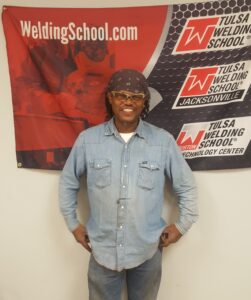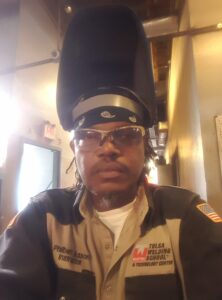TWS is a Great Training Option for Everyone
Learn more about how we can prepare you to advance your career.
Philbert, 53, is a welding instructor at the Tulsa Welding School & Technology Center in Houston, Texas. He came to the U.S at the age of 12 when he moved from Trinidad to Brooklyn, New York. Philbert came to Houston in 2004 and joined Tulsa Welding School two and a half years ago.
Thanks for your time, Philbert. Tell us a little about your welding background.
When I came to America at age 12, they put me in seventh grade. Realistically, because of what I’d learned in Trinidad, I should have been in twelfth grade and getting ready to leave school, so I got bored. I dropped out at 16, got my GED and signed up for JobCorps in Texas at 17. That’s when I first learned how to weld.
When I came out of JobCorps, everybody told me I was still a little wet behind the ears, so I ended up going to another JobCorps in Kentucky and took welding again. After that, I went back to New York. I started working on boilers for Brooklyn Boiler Service, then I worked in the shipyards. When I decided to go for the higher-paying jobs, everybody asked me, “What does Texas or Kentucky have to do with New York?” So I went to Apex Technical School in Manhattan and took welding again! I went to three different welding schools.
Have You Considered a Career in the Skilled Trades?
Fill out the form to recieve a no obligation info packet.
Why did you choose welding?
Growing up in Trinidad, there was a welding shop across the street from my school. I was eight years old, and I asked what they were doing. The only thing I remember them telling me was that they were gluing metal together, and I thought it was absolutely fascinating.
I considered all the trades, but I noticed that in most of them, you had to be an apprentice for years before you could actually become a licensed plumber, electrician or carpenter. So I asked, “How do you become a welder?” and they said, “you pass a test and you’re a welder!” I decided to dedicate myself to welding. I wanted to learn everything about it.
So as a boy, did you want to be a welder?
Actually, I wanted to be a surgeon. I always liked to cut open stuff and sew it back up. But I was the youngest in my family. I have eight brothers and two sisters. I saw who went to college, who didn’t. What they came out with didn’t really impress me. That’s why I decided on a trade.

New: Industrial Maintenance
Learn About Our New Advanced Industrial Maintenance Program in Houston
Tulsa Welding School is proud to announce our newest program offering available at our Houston Campus – Advanced Industrial Maintenance Technology! Learn the skills you need to take on the industries of manufacturing, distribution, energy production and facility maintenance in as few as 7 months.
You’ve worked in fabrication, plants, shipyards and boilers. Why did you decide to go into teaching?
In 2014/2015, the economy went bad for the oil business. I looked around and realized that the average welder was in his 60s, a dying breed. That’s when I saw the ad for Tulsa. In all the jobs I ever worked, I was always a lead man with a group of welders, fitters and helpers that I had to train. I was 50, and it was time for me to pass on my knowledge. I thought I’d get satisfaction from giving my knowledge to people who had never welded and enabling them to take care of their families and earn a good living.
Is that what you enjoy most about teaching?
Yes, that is very satisfying. But what I really like about it is that I can take whatever interests you have, whether it’s music, race car driving or fishing—whatever hobby you have, I can actually transform welding into that, make it relatable, so you can understand it and accept it a whole lot easier.
This is your first full-time teaching job. Are you enjoying it?
I tell my students every day that if you enjoy what you do, you don’t work a day in your life. So I am not working! Being here is like being at Toys R Us. I get to play with all the toys!
Why did you choose TWS?
I’d heard of Tulsa Welding School before I started welding 36 years ago. Back in the 80s, everybody told me I had to go to Tulsa Welding School to become a welder. I didn’t want to because I didn’t want my parents to sign for anything for me. I wanted to do it all on my own terms, so I went to JobCorps.
Tell me something most people don’t know about you.
My mother is Chinese. Most people wouldn’t know that! What else? Back in 1991, I worked for the Parks Department in Brooklyn for about five years. In winter, I used to work at an ice skating rink and teach ice hockey, and in the summer I was a blacksmith’s helper!
If you could choose to have dinner with anyone, alive or dead, who would it be?
I’d like to have dinner with John D. Rockefeller. I hear he was a very interesting guy. He didn’t have a whole lot of education and made it pretty far. I’d like to learn more about him.
Tell us about your family.
My wife Delia and I got married in 2000. We have three stepdaughters and three grandkids. My wife is a welder, too.
If you weren’t a teacher, what would you do?
I think I’d go back and do architecture or engineering, where I could visualize something and create it. I started architectural drawings when I was 11. That helped me with my blueprint readings.
You get an unexpected afternoon off. What would you do?
My wife and I would go fishing. We love to fish off the beach but don’t have the time to do it.
In the field, what was your favorite tool of the trade?
My mind. Any tool is only good if you know how to use it. I’ve done a lot of jobs with limited tools, but I utilized my mind to make my job easy.
You’ve had a varied welding career. What’s your favorite part of the industry?
Working with boilers. There are so many different types—residential, commercial. Even though they are essentially the same, each one is a little different. I’ve worked on some that are so big, you could park an 18-wheeler inside, and I’ve worked on others the size of a garbage can.
What advice do you have for new students who may be considering attending TWS?
Time stands still for no one. Our classes are just five hours and 15 minutes a day, so utilize that time wisely, because once it’s gone, it’s gone. You have to be in that booth doing what you have to do. I always tell students to “do it again” because you want to get to where you’re comfortable with it.
If you could tell one person “thank you” for helping you become the man you are today, who would that be and why?
My father. He always told me that if I see something that I’ve never seen or done before, pay attention. He told me to take that information and put it in my back pocket. As you go through life, you’re going to run into stuff where you may need to pull that information back out. Pay attention to everything, because knowledge is power.
This blog has been labeled as archived as it may no longer contain the most up-to-date data. For a list of all current blog posts, please visit our blog homepage at https://www.tws.edu/blog/







